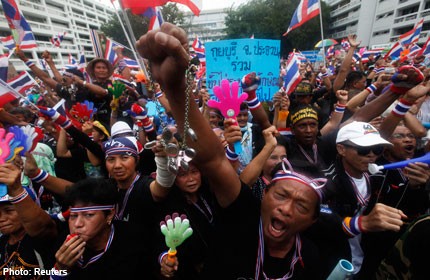Thai political protests paralyse more ministries

BANGKOK - Thai opposition protesters besieged several more ministries in Bangkok on Tuesday to try to topple the government, as Prime Minister Yingluck Shinawatra faced a no-confidence motion in parliament and warned against "mob rule".
Tens of thousands of demonstrators have rallied against Yingluck and her brother, ousted premier Thaksin Shinawatra, in the biggest street protests since 2010, when more than 90 civilians were killed in a military crackdown.
Demonstrators surrounded the interior, agriculture, transport, and sports and tourism ministries, ordering officials inside to leave, a day after occupying the finance and foreign ministries.
The turmoil has raised fears of fresh street violence in a country that has been rocked by several episodes of political unrest since royalist generals overthrew Thaksin in a 2006 coup.
The billionaire telecoms tycoon-turned-politician draws strong support from many of the country's rural and urban working class. But he is loathed by the elite and the middle classes, who accuse him of being corrupt and a threat to the monarchy.
Several thousand protesters, waving Thai flags and blowing whistles, marched to the interior ministry, which was guarded by hundreds of security personnel, according to an AFP reporter at the scene.
Demonstrators, who vowed to stay on the street overnight, said they had moved to cut off the water supply to the building and were planning to sever the electricity.
"We don't dislike Thaksin - we loathe him. This is the end for him," said Dhiranut Bunna, a 43-year-old housewife from Bangkok who was among the protesters still at the finance ministry.
Apart from the interior ministry, most government buildings taken over had only a light security presence outside.
But security has been tightened on Bangkok's streets since the expansion late Monday of the Internal Security Act, which gives authorities additional powers to block routes, impose a curfew, ban gatherings and carry out searches.
A Thai court on Tuesday approved an arrest warrant for protest leader Suthep Thaugsuban - who resigned from the opposition Democrat Party to head the rallies - in connection with the occupation of government buildings.
"I ask him to surrender, otherwise police can arrest him on sight," said Colonel Sunthorn Kongklam of Bang Sue police station in the capital.
Yingluck on Tuesday reiterated that authorities would "absolutely not use violence" as she arrived at parliament, which was guarded by dozens of police.
"Everybody must obey the law and not use mob rule to upstage the rule of law," she told reporters.
The no-confidence motion was put forward last week by the Democrats, who have not won an elected majority in parliament in about two decades, as part of a barrage of challenges to Yingluck's embattled government.
Debate began Tuesday and the ruling Puea Thai party, which holds a comfortable majority, is expected to win the censure vote expected later in the week.
Adding to tensions in the capital, an unexploded hand grenade was discovered outside a Democrat Party office in Bangkok Tuesday, police said.
'Big move' threatened
Recent protests were sparked by Puea Thai plans to introduce an amnesty that could have allowed the return from self-imposed exile of Thaksin.
Outrage over that plan failed to ebb after the amnesty was quashed by the Senate on November 11.
Protest spokesman Akanat Promphan said the protesters would wait until Wednesday before making a "big move". Authorities said demonstrators had ended their occupation of the foreign ministry as they focused on other targets.
Both the United States and Britain raised concerns over the rallies.
They are the biggest challenge yet for Yingluck, who swept to power in 2011 polls on a wave of Thaksin support from the "Red Shirts", whose 2010 protests were crushed by the then Democrat-led government.
"Suthep is not trying to throw out the government... he wants to throw out democracy and replace it with an ultra-royalist administration," Red Shirt leader Thida Thavornseth told AFP.
A series of protests by the royalist "Yellow Shirts" helped to trigger the coup that toppled Thaksin, who now lives abroad to avoid a prison term for corruption that he contends was politically motivated.
[[nid:62336]]